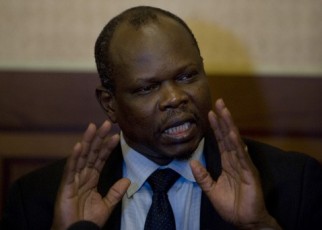Nafie accuses Juba’s negotiators of plotting to topple Sudan’s gov’t
February 22, 2012 (KHARTOUM) – Sudan’s presidential assistant, Nafie Ali Nafie, has accused negotiators from neighbouring South Sudan of having no intention to reach a deal with Khartoum on post-secession issues because they have other plans in mind.

However, he charged that Juba would not do likewise unless it replaces the negotiators representing it in the Ethiopian capital Addis Ababa, which hosts the talks.
According to Nafie, South Sudan’s current negotiators believe that any agreement with Khartoum would go against Juba’s strategy of supporting rebel groups in Sudan’s border regions of South Kordofan and Blue Nile as well as supporting opposition forces despite the fact that they are aware that these forces are weak and unable to achieve the goal of regime change.
Talks between Sudan and South Sudan to resolve issues arising from the south’s secession in July last year have faltered despite efforts by the African Union mediators led by former South African President Thabo Mbeki.
Continued failure to reach agreements over disputed territories, especially Abyei, and the transportation of South Sudan’s oil via Sudan gave rise to increased tension and talk of a return to war.
Nafie’s accusation could be an indirect reference to South Sudan’s chief negotiator Pagan Amum which Khartoum repeatedly accuses of harbouring a hostile attitude towards the Sudanese government.
The next round of talks between the two countries on oil is scheduled for 6 March though prospects for a solution appear slim. Sudan has asked Juba for $36 per barrel of oil exported through its pipelines. South Sudan rejects the figure but has offered to pay $2.6 billion to its northern neighbour and forgive Khartoum’s debt of $2.8 billion.
In an interview with the London-based Al-Sharq Al-Awsat, Amum said that oil revenues helped Khartoum wage wars and commit genocide and crimes against humanity in Darfur and elsewhere. This, he said, prompted South Sudan to withdraw its $2.6 billion offer.
Khartoum also accuses Juba of supporting rebels fighting the Sudanese government in South Kordofan and Blue Nile, citing the rebels’ affiliation to Juba’s ruling party before independence.
Sudanese officials have accused South Sudan of seeking to topple the government in Khartoum through economic pressure after Juba decided last month to suspend the production of oil, the lifeline of both economies, in protest of Khartoum’s confiscation of the commodity as it passed through its territory.
Juba now wants to develop an alternative pipeline to Kenya or Djibouti to bypass Sudan.
On his end the Norweigian minister said oil pipeline projects tend to take longer than planned.
“I see very few people in the international community who consider this feasible in the short-term,” Solheim told Reuters.
“A much more realistic option would be to find a settlement using the north-south pipeline in meantime while then you can consider a long-term solution,” he said during a visit to Khartoum.
Norway is advising Sudan and South Sudan on developing their oil industries.
Asked whether Juba would be able to build a pipeline to the Kenyan coast within 11 months as planned, Solheim said: “It’s a very optimistic assessment.”
In a related development, Sudan’s foreign minister, Ali Karti, stressed that his country is keen to reach a quick agreement with South Sudan to the oil problem and other issues complicating the relationship between the two countries.
“We have a new round of talks scheduled by the end of this month and we hope to reach a solution there,” he said in Khartoum after meeting his Malaysian counterpart on Wednesday.
(ST)
